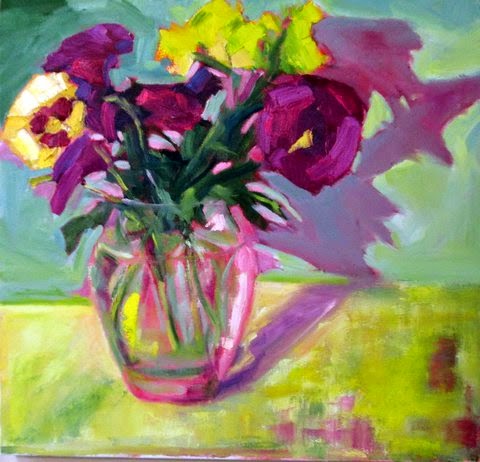Think This Way Before You Start A Painting
Ideas always acquire appearance veils, the attitudes that people acquire of their time and earlier time. Really good artists tear down those veils. -Frances Bacon
Winter in New England leaves me plenty of time to reflect on many of the processes that contribute to making art. First up: what I think about before starting to work. Following that is what a couple of other artists say they consider before, or at the beginning of a work.
Five things to think about before starting a painting:
1. How will my ideas and observation interact and work together?
Observation might be the main thrust of what I am doing, but working in support of an idea that was exciting to begin with makes a work that has a stronger finish. Or the idea is striking, and observation shows the way to pare down the extraneous detail to support the idea.
2. What is the most concise way to clearly express the idea of the painting?
I don't spend enough time on this one!
3. How will the size of the work contribute?
Large or intimate, somewhere in between that is familiar and easy?
4. What color range might work?
Yeah. Good question.
5. Am I able to experiment and change within the framework I set up?
At some point I may have to throw out the first idea and rethink the whole thing.
*From Richard Diebenkorn, found in his studio after his death:
1. Attempt what is not certain. Certainty may or may not come later. It may then be a valuable delusion.
2. The pretty, initial position which falls short of completeness is not to be valued-except as a stimulus for further moves.
3.Do search. But in order to find other than what is searched for.
4. Use and respond to the initial fresh qualities but consider them absolutely expendable.
5. Don't "discover" a subject-of any kind.
6. Somehow don't be bored-but if you must, use it in action. Use its destructive potential.
7. Mistakes can't be erased but they move you from your present position.
8. Keep thinking about Pollyanna.
9. Tolerate chaos.
10. Be careful, but only in a perverse way.
From artist and teacher Skip Lawrence:
1. Why do I paint?
2. How can I make my work express my ideas?
3. What is uniquely mine and how can I further develop that?
4. What brings me the greatest pleasure in painting?
There are no wrong answers to these questions as long as the answers are honest.
1. Why do I paint?
2. How can I make my work express my ideas?
3. What is uniquely mine and how can I further develop that?
4. What brings me the greatest pleasure in painting?
There are no wrong answers to these questions as long as the answers are honest.
* from " The Art of Richard Diebenkorn" Whitney Museum 1998



Comments
Post a Comment